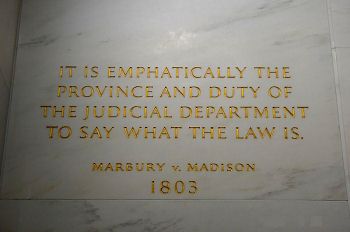
|
16A011 A Garland for Frankenstein by Jim Davies, 3/29/2016
Merrick Garland is Obama's "finger" to the Republicans for having announced that nobody he nominates to the Supreme Court will be considered this year for confirmation. PBS called him a "Progressive", which is MediaSpeak for Socialist, so sealing his fate. It's rather cruel, really; however bad he is, does he deserve to have such a prize dangled before him and then inevitably taken away? It's a career, crowned by being turned into a decoy duck. The charade has, however, also fingered the importance of SCOTUS in the government scheme of things. As the gilded marble inscription says in its building lobby,  So when all laws disappear with government on E-Day, the demise of the Supreme Court will be the most welcome event of all, for that is the body which says what they are. How come? - doesn't Article 1 Section 1 of the Constitution declare that "All [as in, 100% of] legislative power... is invested in a Congress..."? - so how did SCOTUS get the job? It's a bit complicated, and I told the story more fully in 1789 a while back, but it's so important, I suggest, as to be worth a short re-visit here. First, the founders wrote Article 3, which establishes a supreme and various inferior courts, as the third branch of the FedGov with the "judicial Power of the United States." It doesn't say what that power is. Nor does it place particular limits upon it; and both omissions make this Article different from the first two. However the "judicial power" must include authority to render judgment, and in the case of the Supreme Court, to be the final such authority or arbiter. And if it's to decide cases on the basis of laws Congress wrote, it must have the power to decide just what they mean. Hence, the Judicial Branch "says what the law is." If a law Congress wrote appears to say Up, but SCOTUS declares it to mean Down, then from that time onwards, the law really, truly, does mean Down. Despite Article 1 Section 1, this must be so if there is to be a government with any pretense of a justice system. This was not an accident or an oversight. It's integral to what the founders founded. Except in an absolute monarchy, that's how it must always be. It you or I were to design a government system (perish the thought!) we'd have to do the same thing, more or less. Final arbiters arbitrate finality. This is quite bad enough, but it gets worse: Article 3 is silent on the important question of "Judicial Review" despite some hot debate about it in the Constitutional Convention. Hamilton and his Federalist friends wanted to clarify that SCOTUS should be empowered to decide whether or not a law enacted by Congress conforms to the Constitution, and argued that supreme courts do normally have such power; Jefferson and his anti-Federalist pals argued the opposite, saying (correctly) that if it did, Congress would be superfluous and the country would be ruled by a clique of lawyers in robes. They couldn't agree, so they left it vacant; Article 3 neither grants such power nor withholds it. It was a blank check, to be filled in later. The filling-in was done by the brain-twisting case of Marbury v Madison, in 1803, from which the inscription above was taken. The set-up came in the 1789 Judiciary Act, which purported to extend SCOTUS' power by making it a court of "original jurisdiction" for certain cases. Marbury took advantage of that in an action he brought against Secretary of State Madison, but the Court refused to hear the case, saying it did not have the power of original jurisdiction because Congress did not have the power to grant it, for to grant it would be to amend the Constitution. Fair enough; but now comes the kicker: in declaring the Judiciary Act to be unconstitutional, the Marshall court was exercising the power of judicial review, and thereby amending the Constitution! SCOTUS was doing the very thing it was (rightly) saying Congress could not do: amending the charter from which it derived all such powers as it had. At that point the anti-Federalists could have organized a move to write a new Amendment, to deprive SCOTUS of the judicial-review power it had just grabbed; but they didn't. Hence, it has had that power ever since. I reason that, with some possible exceptions like Jefferson, the founders intended all along that the Court should indeed have that power and hence, the actual and final power of government in the United States is possessed by an oligarchy of lawyers. The whole charade of congressional and presidential elections is merely sugar, coating the pill for a gullible public. The powers to (a) decide what laws mean and say and (b) decide whether a law conforms or not to the Constitution equip the Supreme Court with that near-dictatorial ability, and it's important to note that this is the way it was deliberately established. Our friends who call for a "return to the Constitution" are endorsing a lawyers' oligarchy. Further, I cannot see any way to establish a governed society without some very similar arrangement. Can you? If you join me in finding that repulsive, there is only one alternative: a zero government society. Help form one here. |









